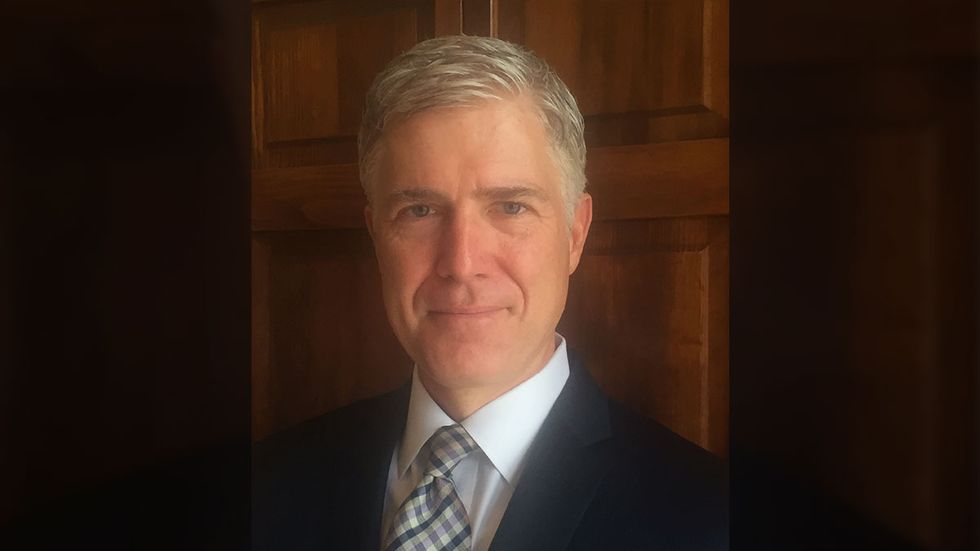
© 2024 Blaze Media LLC. All rights reserved.
Donald Trump has nominated 10th Circuit Judge Neil Gorsuch to fill the late Antonin Scalia’s seat on the Supreme Court.
Here’s what you need to know:
1. His academic resume alone is very impressive:
He completed his undergraduate studies at Columbia University in New York, got his J.D. from Harvard Law School, and then earned his doctorate from Oxford after studying under the titanic legal philosopher and natural lawyer John Finnis.
2. There would also be another interesting first:
After clerking under Justice Byron White, Gorsuch clerked for Justice Anthony Kennedy. If confirmed, it would be the first time a Supreme Court justice sat on the same bench as a jurist for whom he’d previously clerked.
3. He knows the struggles of being a conservative on a liberal college campus:
A bio prepared by the Alliance for Justice during his confirmation process in 2006 outlines his conservative student journalism 30 years prior:
“While in college, Mr. Gorsuch co-founded a newspaper and a magazine at Columbia University. Both publications – The Morningside Review (the magazine) and The Federalist (the newspaper) – were intended to counter what Mr. Gorsuch and his co-founders saw as the predominance of liberal political views at Columbia during the mid-to-late 1980s. A review of available issues of the The Morningside Review, located in the Columbia archives, revealed two pieces authored by Mr. Gorsuch: one was a comment on U.S. policy in Afghanistan; the other, a general defense of conservative political philosophy. The Columbia archives also contain most, but not all, of the editions of the The Federalist published during Mr. Gorsuch’s tenure at the paper. According to its initial statement of purpose, The Federalist attempted to provide a “classically liberal” forum for conservative students and others who want to air views not typically heard on campus. Mr. Gorsuch, one of the paper’s three founders, served on the board of editors and later as a contributor.”
4. He’s no fan of over-litigation:
Frivolous lawsuit-mongers — leftist and otherwise — may want to take heed to Gorsuch’s 2005 op-ed in National Review, where he calls out the Left’s obsession with what Justice Scalia called “social transformation without representation”:
During the New Deal, liberals recognized that the ballot box and elected branches are generally the appropriate engines of social reform, and liberals used both to spectacular effect–instituting profound social changes that remain deeply ingrained in society today. In the face of great skepticism about the constitutionality of New Deal measures in some corners, a generation of Democratic-appointed judges, from Louis Brandeis to Byron White, argued for judicial restraint and deference to the right of Congress to experiment with economic and social policy. Those voices have been all but forgotten in recent years among liberal activists. It would be a very good thing for all involved–the country, an independent judiciary, and the Left itself–if liberals take a page from David von Drehle and their own judges of the New Deal era, kick their addiction to constitutional litigation, and return to their New Deal roots of trying to win elections rather than lawsuits.
5. He’s pro-term limits (or at least was during the Bush 41 administration):
According to a 1992 paper he co-authored shortly after finishing law school at Harvard:
Recognizing that men are not angels, the Framers of the Constitution put in place a number of institutional checks designed to prevent abuse of the enormous powers they had vested in the legislative branch. Bicameralism, frequent elections, staggered terms, differing qualifications, shared and exclusive powers, and state control over election procedures are all examples of the mechanisms the Framers crafted with the hope of ensuring a responsive yet responsible legislature. A term limit, we suggest, is simply an analogous procedure designed to advance much the same substantive end.
Gorsuch and Guzman argue that this has been upended by the party system, legislative seniority, committee assignments and things of that ilk, thus precipitating term limits.
6. He’s literally written a book on life issues:
After studying the issue at Oxford, Gorsuch penned a book about the moral and legal arguments surrounding the end-of-life debate, entitled “The Future of Assisted Suicide and Euthanasia.” Published by Princeton University Press, the work is cited extensively in Ryan Anderson’s Heritage Foundation paper on physician-assisted suicide from 2015.
7. He’s also a rock star on federal regulations administrative law:
One area where Neil Gorsuch appears to be more of an originalist than Justice Scalia is on the question of giving federal agencies the ability to interpret statutes themselves and make de-facto regulations. The so-called Chevron Deference is one area where Gorsuch has made substantial waves as an appellate judge with a dynamite opinion back in August:
“There’s an elephant in the room with us today. We have studiously attempted to work our way around it and even left it unremarked. But the fact is Chevron and Brand X permit executive bureaucracies to swallow huge amounts of core judicial and legislative power and concentrate federal power in a way that seems more than a little difficult to square with the Constitution of the framers’ design. Maybe the time has come to face the behemoth.”
“For administrative law nerds, U.S. Tenth Circuit Court Judge Neil Gorsuch’s” Chevron opinion “is about as thrilling as it gets,” reads a press release from the Pacific Legal Foundation.
8. He’s no fan of over-criminalization:
In a 2013 lecture at the Federalist Society, Gorsuch tackled head on the problem of having far too many laws on the books:
“What about our criminal justice system, you might ask. It surely bears its share of ironies too. Consider this one. Without question, the discipline of writing the law down—of codifying it—advances the law’s interest in fair notice. But today we have about 5,000 federal criminal statutes on the books, most of them added in the last few decades, and the spigot keeps pouring, with literally hundreds of new statutory crimes inked every single year."
“Neither does that begin to count the thousands of additional regulatory crimes buried in the federal register. There are so many crimes cowled in the numbing fine print of those pages that scholars have given up counting and are now debating their number."
“When he led the Senate Judiciary Committee, Joe Biden worried that we have assumed a tendency to federalize, ‘Everything that walks, talks, and moves.’ Maybe we should say ‘hoots’ too, because it’s now a federal crime to misuse the likeness of Woodsy the Owl. (As were his immortal words: ‘Give a hoot, don’t pollute!’) Businessmen who import lobster tails in plastic bags rather than cardboard boxes can be brought up on charges. Mattress sellers who remove that little tag? Yes, they’re probably federal criminals too."
9. He pulls no punches on due process rights:
Another notable area of Neil Gorsuch’s jurisprudence revolves around the Fourth Amendment and his decisions on issues surrounding search and seizure — especially as they relate to technology and cyber security. “New technologies bring with them not only new opportunities for law enforcement to catch criminals,” he wrote in an opinion in U.S. v. Denson, “but also new risks for abuse and new ways to invade constitutional rights.”
In another case, which focused on police entering a property without consent, Gorsuch ruled that the home owner had “unambiguously” revoked the government’s ability to enter his home unwarranted when he posted a no-trespassing sign on his property.
10. He won’t be that easy to confirm:
With a resume this impressive, Senate Democrats are going to put up one hell of a fight to get someone more “mainstream,” as Minority Leader Chuck Schumer, D-N.Y. (F, 2%) has demanded. Republicans will either have to get rid of the filibuster for judicial nominations or invoke the two-speech rule to get Gorsuch onto the bench.
Want to leave a tip?
We answer to you. Help keep our content free of advertisers and big tech censorship by leaving a tip today.
Want to join the conversation?
Already a subscriber?
more stories
Sign up for the Blaze newsletter
By signing up, you agree to our Privacy Policy and Terms of Use, and agree to receive content that may sometimes include advertisements. You may opt out at any time.
© 2024 Blaze Media LLC. All rights reserved.
Get the stories that matter most delivered directly to your inbox.
By signing up, you agree to our Privacy Policy and Terms of Use, and agree to receive content that may sometimes include advertisements. You may opt out at any time.



